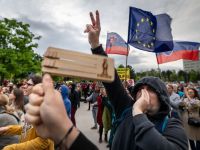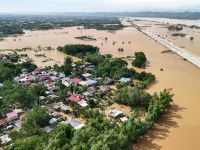In response to a warning that came from Turkish Prime Minister Bulent Ecevit, Iraqi President Saddam Hussein, warned Turkey, in return, not to side with the United States in any possible future conflict.
The Iraqi President declared, "We expect that Turkey complies with principles of good neighborliness and the international law and confronts, with a balanced… stance, American aggressive threats”, according to the Iraqi News Agency (INA).
"Turkey, Iraq and all the countries in the region have to preserve security and stability in the region. The most important thing for all of us is to work together to make our region [the Middle East] empty of weapons of mass destruction; biological, chemical and nuclear weapons”.
He said seven years of inspections throughout Iraq had shown that the country's deadliest weapons programs had been completely dismantled.
In his letter, Saddam Hussein also stated that Iraq has no weapons of mass destruction and no intention of producing them. The United States has repeatedly expressed its concern that Baghdad is developing such weapons, and recently said that it is up to Iraq to prove it is not.
"Iraq has no weapons of mass destruction and has no intention of making them. Iraq is the first who eagerly wants our region devoid of weapons of mass destruction," President Saddam Hussein said in his letter, according to INA.
Turkey’s leader Ecevit, after visiting Washington last month, sent a message to the Iraqi president calling upon him to immediately permit United Nation's weapons inspectors in the country, or risk a possible U.S. attack.
The Iraqi president said the United States is using the issue of weapons inspections as a pretext for a planned attack.
“America, at any time and under any condition, can directly fabricate false pretexts or use its power in the inspection teams to launch aggression and this … happened earlier. Therefore, countries in this region should work to confront such policy and refuse subjugation”.
The statement was the first of its kind issued on weapons inspections by the Iraqi President since Baghdad offered last month to reopen discussions with the United Nations.
Diplomats say those talks could potentially lead to the return of U.N. weapons inspectors, who withdrew from Iraq some three years ago, just before the United States and Britain began a major bombing campaign, saying Iraq was not cooperating with inspectors. The United States has charged that Iraq did not allow inspectors access to all potential weapons sites.
Saddam added, “The United States firstly has to abandon its hostile policies of imposing the embargo and of continuous military aggression in … Iraq, and of interfering in Iraq's internal affairs”.
Russia
Meanwhile, Russian deputy foreign minister Alexander Saltanov on Saturday said tackling the Iraqi file should be on basis of Baghdad’s cooperation with the United Nations on the mass-destruction arms and "suspending" curbs on this country.
Saltanov expressed confidence that "Russia and the other concerned parties would eventually meet at the same point and would reach the right solution for this question. "The right solution lies with ending the hardships of the Iraqi people simultaneously with ensuring security of the state of Kuwait and other states in the region," Saltanov added.
Asked on Moscow’s diplomatic capacity to forestall a military strike on Iraq, Saltanov affirmed necessity of resolving the Iraqi question according to the international law, diplomatic means, and expressed his belief that this issue could not be resolved with military means. (Albawaba.com)
© 2002 Al Bawaba (www.albawaba.com)







